
After receiving countless amounts of messages from my friends to watch the new drama serial, Zindagi Gulzar Hai, I finally spared some time to catch up with the few episodes that have aired so far. Given the hype surrounding the show, I wasn’t surprised when from the outset, a similar plot was introduced- a plotline that serves the basis for many Pakistani TV series. It reminded me of the serial, Humsafar. No, not because the same actor is acting in this drama, though I have to admit it certainly added to the likeness of the two drama serials. It is primarily because, both the serials show an affluent matriarchal family in which the woman, especially the mother, wields unusual authority and teeters on the brink of transgression. In Zindagi Gulzar Hai, Zaroon's mother is successful in her affairs and makes a show of it by unduly criticising her husband. In dealing with familial affairs, however, she is often careless and mindless. She is snobbish and does not like being questioned. The children go about their daily lives, not bound any limitation whatsoever. When someone frowns down upon this, one of the parents shrugs it off in a way that suggests that their children are mature adults. Yet, the daughter will be seen brazenly wearing a shirt that reads, “Little Miss Jihad". But that has little to do with the drama. The T-shirt is a story in itself. On the contrary, we have the lower middle class family that is striving to reach the top. My concern, however, is not the lower middle class. This, if anything, is portrayed aptly and follows standards of other shows in which there is a sincerity with which the middle class is dealt with. Perhaps it is easier to infuse emotions when we find ourselves confined to a certain lifestyle, and from which we only wish to escape. Sanam Saeed has played well the role of Kashaf, a girl from a middle class family who is being crushed between the emotional distress of having an uncooperative father and joining an elite university, where she meets her insecurities. It is easier to deliver a dialogue that makes the viewer feel the character’s pain. It is a challenge, however, to deliver a dialogue that is meant as light-hearted jest. If done wrong, it could make the viewer furrow his brow or make him shake his head with disapproval or both. There were a couple times when the dialogue was too over the top: the admission result day when Zaroon and his friends mock the girl who outshone Zaroon; the drive back to his home; the scene in which Zaroon’s sister is pestering him to drop her off to a friend’s, and so on. The depiction of 'spoiled rich kids' seems a little overdone. Let’s just say, in those two episodes I watched, my brow furrowed and my head shook with disapproval quite a few times. I understand that it is important to use slang in conversation, but throwing “yaar” in every scene is unnecessary and irksome. The elite family structure, portrayed in Zindagi Gulzar Hai, is depicted as self-righteous with complete disregard to principles. It is portrayed in such an extreme way that it almost looks unrealistic. Coupled with mediocre acting skills on behalf of a few actors, particularly Mehreen Raheel and Ayesha Omar, it becomes completely unbelievable and at times hilarious. There is little truth in the acting- a truth that so easily lends itself to Sanam Saeed, as she slips into the character of a young girl. Having said as much, the actors mirroring the typical middle-class Pakistani roles are redeeming the show for me, especially when it comes to the aesthetics. Kashaf is shown dressed in very plain clothes and so are his sisters and mother. Unlike many other dramas where lower middle class girls are caked in makeup, this one shows a very soft, realistic image of the sisters. Samina Pirzada does not disappoint. Where she can play the role of a rich, glamorously vengeful woman, she also does justice to her role of a government school principal and stressed mother who sacrifices all she can for the best of her children. However, she is not shown to be suppressed, which is great. She has a soft motherly aura, but is also a determined (and at times stern) woman who likes to make her own decisions. Let's hope the next few episodes of this show reveal a deeper theme and hook me in. I have unending faith in the Pakistani drama industry and I know that the actors in this show have the capacity to put on something really special.


 (Meerab and Mehreen.)
Then enters Meerab and Mehreen’s college friend, Maya, who is married to a dual-national multimillionaire. During their college days, Maya was infatuated by Meerab, but Meerab ended up proposing to Mehreen.
Maya’s husband, Arsalan Shah, whose
(Meerab and Mehreen.)
Then enters Meerab and Mehreen’s college friend, Maya, who is married to a dual-national multimillionaire. During their college days, Maya was infatuated by Meerab, but Meerab ended up proposing to Mehreen.
Maya’s husband, Arsalan Shah, whose  (Maya, the third wheel in Meerab and Mehreen's life)
Maya persuades Mehreen to start working so she can earn a living and stop complaining about not living a luxurious life. Maya’s persuasion has an underlying intention – distancing Mehreen and Meerab.
Thus, the plot thickens and the typical innocent and unassuming heroine and the vicious villain emerge!
Eventually, Maya succeeds in doing so and Mehru and Meerab’s happy little home starts to fall apart.
(Maya, the third wheel in Meerab and Mehreen's life)
Maya persuades Mehreen to start working so she can earn a living and stop complaining about not living a luxurious life. Maya’s persuasion has an underlying intention – distancing Mehreen and Meerab.
Thus, the plot thickens and the typical innocent and unassuming heroine and the vicious villain emerge!
Eventually, Maya succeeds in doing so and Mehru and Meerab’s happy little home starts to fall apart.
 (Mehreen, Meerab and Maya)
Apart from being clichéd, the storyline was extremely misogynistic.
Meerab blamed Mehreen, and construed that their marriage fell apart because of Mehreen’s
(Mehreen, Meerab and Maya)
Apart from being clichéd, the storyline was extremely misogynistic.
Meerab blamed Mehreen, and construed that their marriage fell apart because of Mehreen’s  (Meerab and his children.)
While it is understood that the target audience of such dramas are housewives, this alone doesn’t justify the stereotypical script.
And it’s not just NKTMN; every other drama has the same storyline – the wife destroys a happy family setup, as she
(Meerab and his children.)
While it is understood that the target audience of such dramas are housewives, this alone doesn’t justify the stereotypical script.
And it’s not just NKTMN; every other drama has the same storyline – the wife destroys a happy family setup, as she 



 Sanam Baloch, who plays the role of Kiran in Kankar. Photo: Kankar Official Facebook Page[/caption]
With more and more research unearthing the fact that many Pakistani
Sanam Baloch, who plays the role of Kiran in Kankar. Photo: Kankar Official Facebook Page[/caption]
With more and more research unearthing the fact that many Pakistani  Fahad Mustafa, who plays the role of Sikander in Kankar. Photo: Kankar Official Facebook Page[/caption]
She remarries a man who takes her around on a motorbike and she is busy with household chores all day. She leaves behind a life of luxury, simply because this man will potentially respect her more.
Mind you, she doesn’t leave Mr ‘I-love-you-means-I-can-beat-you’ right away. She gives him warnings and chances. It is
Fahad Mustafa, who plays the role of Sikander in Kankar. Photo: Kankar Official Facebook Page[/caption]
She remarries a man who takes her around on a motorbike and she is busy with household chores all day. She leaves behind a life of luxury, simply because this man will potentially respect her more.
Mind you, she doesn’t leave Mr ‘I-love-you-means-I-can-beat-you’ right away. She gives him warnings and chances. It is  Cast of Kanker. Photo: Kanker Official Facebook Page[/caption]
One friend said,
Cast of Kanker. Photo: Kanker Official Facebook Page[/caption]
One friend said,
 Photo: Kanker Official Facebook Page[/caption]
As expected, Kiran was stigmatised by society and even discouraged by her sister and parents to take a divorce. But here’s the catch: To her, her
Photo: Kanker Official Facebook Page[/caption]
As expected, Kiran was stigmatised by society and even discouraged by her sister and parents to take a divorce. But here’s the catch: To her, her  Kiran and Sikander as played by Sanam Baloch and Fahad Mustafa in Kanker. Photo: Kanker Official Facebook Page[/caption]
An interesting dynamic, as a young friend pointed out, was how this strategy of ‘controlling’ a woman via abuse is passed on like a family heirloom for generations.
Kiran and Sikander as played by Sanam Baloch and Fahad Mustafa in Kanker. Photo: Kanker Official Facebook Page[/caption]
An interesting dynamic, as a young friend pointed out, was how this strategy of ‘controlling’ a woman via abuse is passed on like a family heirloom for generations.

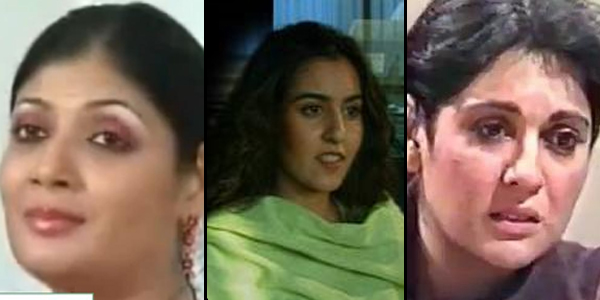 Nazli of Dhuaan (L), Shahnaz of Alpha Bravo Charlie (C) and Zara of Tanhayan (R)[/caption]
We are psyched into believing that the violence is fed to us on our demand but the reality is, like a curse, the degeneration of society has seeped into our dramas. Drama industry is cocooned into the safe zone and not ready to venture out and experiment.
We are living in the exciting times of
Nazli of Dhuaan (L), Shahnaz of Alpha Bravo Charlie (C) and Zara of Tanhayan (R)[/caption]
We are psyched into believing that the violence is fed to us on our demand but the reality is, like a curse, the degeneration of society has seeped into our dramas. Drama industry is cocooned into the safe zone and not ready to venture out and experiment.
We are living in the exciting times of 

 Photo: Ravi Nitesh[/caption]
Once the conversation began, I must say, I was not disappointed.
Imran sounded like a
Photo: Ravi Nitesh[/caption]
Once the conversation began, I must say, I was not disappointed.
Imran sounded like a 
 Photo: Mera Naam Yousuf Hai Official Facebook Page[/caption]
Director
Photo: Mera Naam Yousuf Hai Official Facebook Page[/caption]
Director  Photo: Mera Naam Yousuf Hai Official Facebook Page[/caption]
I have always been a great fan of Rahman’s female characters; they are always very strong-willed and independent, very different from the
Photo: Mera Naam Yousuf Hai Official Facebook Page[/caption]
I have always been a great fan of Rahman’s female characters; they are always very strong-willed and independent, very different from the  Photo: Mera Naam Yousuf Hai Official Facebook Page[/caption]
With a mother like that, how can her daughter be any less fascinating?
Zulekha is played with authenticity and charm by
Photo: Mera Naam Yousuf Hai Official Facebook Page[/caption]
With a mother like that, how can her daughter be any less fascinating?
Zulekha is played with authenticity and charm by  Photo: Mera Naam Yousuf Hai Official Facebook Page[/caption]
The essential charm of this story is its utter simplicity combined with aspiration for something more in life than just the expected. The hope that even when we live lives that are less than ordinary, perhaps we too can have a chance at something as wonderful and genuine as true love.
From the first episode, at least, MNYH has raised great expectations as an entertaining and well-crafted serial that should be on everyone’s watch list. Hopefully, it will manage to avoid the two pitfalls of many highly anticipated serials: stretching episodes beyond the story’s limits and a director afraid of doing their job by effectively translating the writer’s work on screen instead of just filming the story that is written.
Jabbar is, by reputation, a fearless director and I hope that A Plus can balance commercial concerns with aesthetic ones, making this a product viable in both ways.
Photo: Mera Naam Yousuf Hai Official Facebook Page[/caption]
The essential charm of this story is its utter simplicity combined with aspiration for something more in life than just the expected. The hope that even when we live lives that are less than ordinary, perhaps we too can have a chance at something as wonderful and genuine as true love.
From the first episode, at least, MNYH has raised great expectations as an entertaining and well-crafted serial that should be on everyone’s watch list. Hopefully, it will manage to avoid the two pitfalls of many highly anticipated serials: stretching episodes beyond the story’s limits and a director afraid of doing their job by effectively translating the writer’s work on screen instead of just filming the story that is written.
Jabbar is, by reputation, a fearless director and I hope that A Plus can balance commercial concerns with aesthetic ones, making this a product viable in both ways.
 Photo: Facebook page[/caption]
If you have missed Mahira post-
Photo: Facebook page[/caption]
If you have missed Mahira post- Photo: Facebook page[/caption]
[caption id="" align="alignnone" width="600"]
Photo: Facebook page[/caption]
[caption id="" align="alignnone" width="600"] Photo: Facebook page[/caption]
From what I have heard, a major part of the movie was shot in Karachi while some of the scenes were also shot in San Francisco. So if you are romantic soul in search of wanderlust, you’d love the movie for the locations and the mesmerising views.
3. Balle Balle is the new London Thumukda
[embed width="620"]http://www.dailymotion.com/video/x2twdft[/embed]
Okay, I know this may come off as a bit exaggerated, but the songs were pretty good. Balle balle stole the show for me, While Maula Maula came in second, because Abida Parveen. Enough said!
4. Support #PakistaniCinema
Let’s be honest, we all want our entertainment industry to grow and flourish. Since the past two years, Pakistan has witnessed a changing trend in the movie industry. Due to the inception of
Photo: Facebook page[/caption]
From what I have heard, a major part of the movie was shot in Karachi while some of the scenes were also shot in San Francisco. So if you are romantic soul in search of wanderlust, you’d love the movie for the locations and the mesmerising views.
3. Balle Balle is the new London Thumukda
[embed width="620"]http://www.dailymotion.com/video/x2twdft[/embed]
Okay, I know this may come off as a bit exaggerated, but the songs were pretty good. Balle balle stole the show for me, While Maula Maula came in second, because Abida Parveen. Enough said!
4. Support #PakistaniCinema
Let’s be honest, we all want our entertainment industry to grow and flourish. Since the past two years, Pakistan has witnessed a changing trend in the movie industry. Due to the inception of  Photo: Facebook page[/caption]
Everyone will be confused in the first half of the movie. Fifty minutes into the movie and you’d still be watching Mahira going gaga over her cousin, Irtiza, who she’s in love with.
3. No clarity
[caption id="" align="alignnone" width="600"]
Photo: Facebook page[/caption]
Everyone will be confused in the first half of the movie. Fifty minutes into the movie and you’d still be watching Mahira going gaga over her cousin, Irtiza, who she’s in love with.
3. No clarity
[caption id="" align="alignnone" width="600"] Photo: Facebook page[/caption]
Humayun is no doubt a brilliant actor and I believe he should have been given more screen presence throughout the movie. Also, Humayun goes abroad for two years and it’s still not clear why he actually went there. ‘It’s good for his career’, is all he said in the movie. No other explanation was given as to why he went abroad. Was it a job offer, did you have to go for studies? What exactly did you go there for?
4. Lack of character development
A little more detail and focus on the characters would have helped in a proper character development. Supporting casts were also given very few dialogues. Oh and who was the guy who accompanied Irtiza to and back from the airport? Still unknown.
5. First half was slow
[caption id="" align="alignnone" width="600"]
Photo: Facebook page[/caption]
Humayun is no doubt a brilliant actor and I believe he should have been given more screen presence throughout the movie. Also, Humayun goes abroad for two years and it’s still not clear why he actually went there. ‘It’s good for his career’, is all he said in the movie. No other explanation was given as to why he went abroad. Was it a job offer, did you have to go for studies? What exactly did you go there for?
4. Lack of character development
A little more detail and focus on the characters would have helped in a proper character development. Supporting casts were also given very few dialogues. Oh and who was the guy who accompanied Irtiza to and back from the airport? Still unknown.
5. First half was slow
[caption id="" align="alignnone" width="600"] Photo: Facebook page[/caption]
The first half of the movie was a little slow. However, the second half of the movie managed to pull up the pace and while some scenes were shot brilliantly, some were hazy.
If I had to rate Bin Roye in each department, it would be,
Music: Four out of five
Eye candy: Four out of five
Direction: Three out of five
Overall: Three out of five
If you are looking to take your family out on
Photo: Facebook page[/caption]
The first half of the movie was a little slow. However, the second half of the movie managed to pull up the pace and while some scenes were shot brilliantly, some were hazy.
If I had to rate Bin Roye in each department, it would be,
Music: Four out of five
Eye candy: Four out of five
Direction: Three out of five
Overall: Three out of five
If you are looking to take your family out on 
 Photo: Diyar-e-Dil Facebook page[/caption]
The cast of the drama is strong and the acting definitely makes the serial worth a watch. With names such as Maya Ali (Faarah Wali Khan), Osman Khalid Butt (Wali Suhaib Khan), Hareem Farooq (Arjumand Suhaib Khan), Sanam Saeed (Ruhina Behroze Khan), Mikaal Zulfiqar (Behroze Bakhtiyar Khan), Ali Rehman Khan (Suhaib Bakthiyar Khan) and Ahmad Zeb (Moeez Tajamul), one can expect nothing less than brilliant acting. Farhat Ishtiaq has managed to give each of her characters the luxury of telling their own story in their own way.
[caption id="" align="alignnone" width="600"]
Photo: Diyar-e-Dil Facebook page[/caption]
The cast of the drama is strong and the acting definitely makes the serial worth a watch. With names such as Maya Ali (Faarah Wali Khan), Osman Khalid Butt (Wali Suhaib Khan), Hareem Farooq (Arjumand Suhaib Khan), Sanam Saeed (Ruhina Behroze Khan), Mikaal Zulfiqar (Behroze Bakhtiyar Khan), Ali Rehman Khan (Suhaib Bakthiyar Khan) and Ahmad Zeb (Moeez Tajamul), one can expect nothing less than brilliant acting. Farhat Ishtiaq has managed to give each of her characters the luxury of telling their own story in their own way.
[caption id="" align="alignnone" width="600"] Photo: Diyar-e-Dil Facebook page[/caption]
Apart from traditional values, Diyar-e-Dil is also a story about male bonding. It highlights the male bonding between Agha jaan and his sons, Behroze and Shoaib. Through this aspect of the drama, she also unfolds the phenomenon of bachpan ki mangni (early engagements). The older son, Behroze, refuses to marry the girl his father has picked for him, whereas the younger son honours his father’s wishes by marrying the girl his father chooses for him.
[caption id="" align="alignnone" width="384"]
Photo: Diyar-e-Dil Facebook page[/caption]
Apart from traditional values, Diyar-e-Dil is also a story about male bonding. It highlights the male bonding between Agha jaan and his sons, Behroze and Shoaib. Through this aspect of the drama, she also unfolds the phenomenon of bachpan ki mangni (early engagements). The older son, Behroze, refuses to marry the girl his father has picked for him, whereas the younger son honours his father’s wishes by marrying the girl his father chooses for him.
[caption id="" align="alignnone" width="384"] Photo: Diyar-e-Dil Facebook page[/caption]
The drama focuses on the extent of authority displayed by parents and brings forth defiance prevalent in the youth of today. Sometimes children hold on to this stubbornness, and when they finally let go off it, it is too late.
[caption id="" align="alignnone" width="600"]
Photo: Diyar-e-Dil Facebook page[/caption]
The drama focuses on the extent of authority displayed by parents and brings forth defiance prevalent in the youth of today. Sometimes children hold on to this stubbornness, and when they finally let go off it, it is too late.
[caption id="" align="alignnone" width="600"] Photo: Diyar-e-Dil Facebook page[/caption]
What I like most about Diyar-e-Dil is that it sends out a strong message about how bonds between parents and children should not, and cannot be, broken due to ego issues. This revered bond is not only shared between parents and children, but also between grandparents and grandchildren, a value missing in the Western culture.
[caption id="" align="alignnone" width="600"]
Photo: Diyar-e-Dil Facebook page[/caption]
What I like most about Diyar-e-Dil is that it sends out a strong message about how bonds between parents and children should not, and cannot be, broken due to ego issues. This revered bond is not only shared between parents and children, but also between grandparents and grandchildren, a value missing in the Western culture.
[caption id="" align="alignnone" width="600"] Photo: Diyar-e-Dil Facebook page[/caption]
Men such as the old and frail Agha Jaan, and the very compassionate and just Wali, are the pride of Pakistani society. They not only ride horses and enjoy their wealth but also give equal respect to their subordinates and the women in their lives. Their female family members are their izzat (respect) who they protect; they encourage them to have their own thoughts, to live their own life and do not, in any way, treat them as their property.
The drama shows how
Photo: Diyar-e-Dil Facebook page[/caption]
Men such as the old and frail Agha Jaan, and the very compassionate and just Wali, are the pride of Pakistani society. They not only ride horses and enjoy their wealth but also give equal respect to their subordinates and the women in their lives. Their female family members are their izzat (respect) who they protect; they encourage them to have their own thoughts, to live their own life and do not, in any way, treat them as their property.
The drama shows how  Photo: Diyar-e-Dil Facebook page[/caption]
While the story dies down towards the last few episodes, Wali and Faraah, Agha Jaan’s grand children, emerge as extremely strong people. Wali, as the caretaker of his tribe, has been taught to respect his elders even if they show anger towards him. Faraah, the female lead, portrays admirable traits such as perseverance and the courage to apologise.
[caption id="" align="alignnone" width="590"]
Photo: Diyar-e-Dil Facebook page[/caption]
While the story dies down towards the last few episodes, Wali and Faraah, Agha Jaan’s grand children, emerge as extremely strong people. Wali, as the caretaker of his tribe, has been taught to respect his elders even if they show anger towards him. Faraah, the female lead, portrays admirable traits such as perseverance and the courage to apologise.
[caption id="" align="alignnone" width="590"] Photo: Diyar-e-Dil Facebook page[/caption]
It is easy to get angry and to show anger towards others but it is difficult to mend the shattered pieces of a broken relationship. To ask for forgiveness from others may be hard, but it also is a source of comfort once it is done. This is what Wali sets out to do - put an end to the age-old dispute between his parents and grandparents. The drama hits close to reality and proves that truth always prevails.
I want to thank the team of Diyar-e-Dil for bringing to life the story of a typical Pakistani tribal family and for highlighting their real traditions. This is a refreshing change, especially after reading about bombs, bullets and people dying in the northern areas. Diyar-e-Dil is a must watch for every Pakistani.
Photo: Diyar-e-Dil Facebook page[/caption]
It is easy to get angry and to show anger towards others but it is difficult to mend the shattered pieces of a broken relationship. To ask for forgiveness from others may be hard, but it also is a source of comfort once it is done. This is what Wali sets out to do - put an end to the age-old dispute between his parents and grandparents. The drama hits close to reality and proves that truth always prevails.
I want to thank the team of Diyar-e-Dil for bringing to life the story of a typical Pakistani tribal family and for highlighting their real traditions. This is a refreshing change, especially after reading about bombs, bullets and people dying in the northern areas. Diyar-e-Dil is a must watch for every Pakistani.
 Photo: Facebook/NABILA'S[/caption]
The picture was disturbing on so many levels. The most prominent and applauded transformation was of the girl’s complexion. She went from a dark and
Photo: Facebook/NABILA'S[/caption]
The picture was disturbing on so many levels. The most prominent and applauded transformation was of the girl’s complexion. She went from a dark and 
 One comment, which particularly shocked me, said,
One comment, which particularly shocked me, said,

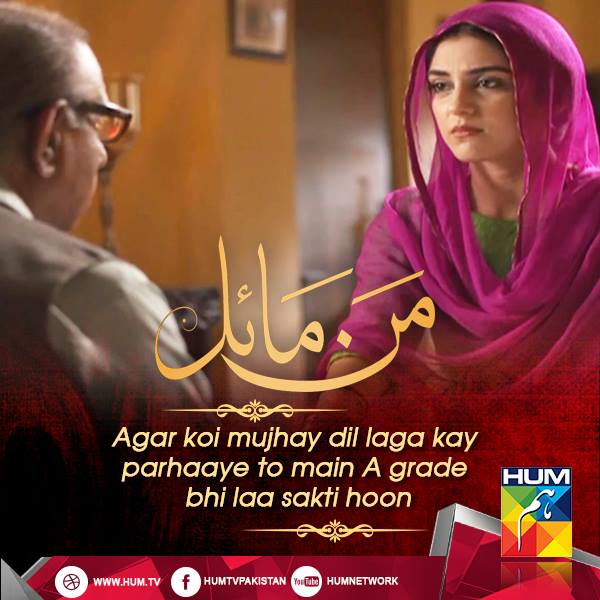 Photo: Mann Mayal - Official Facebook Page[/caption]
Tipu obediently escorts his sister to our protagonist’s house. Another series of supposedly heart-breaking dialogues ensues, which involves a lot of knocking and not opening of doors and rejection. You get the gist?
This was the cliff-hanger of the latest episode of drama serial
Photo: Mann Mayal - Official Facebook Page[/caption]
Tipu obediently escorts his sister to our protagonist’s house. Another series of supposedly heart-breaking dialogues ensues, which involves a lot of knocking and not opening of doors and rejection. You get the gist?
This was the cliff-hanger of the latest episode of drama serial  Photo: Mann Mayal - Official Facebook Page[/caption]
Our hero is so gullible, that he agrees to do just that, no questions asked. To top it all off, he falls in love with her too, instantaneously, of which he showed no signs earlier.
[caption id="" align="alignnone" width="600"]
Photo: Mann Mayal - Official Facebook Page[/caption]
Our hero is so gullible, that he agrees to do just that, no questions asked. To top it all off, he falls in love with her too, instantaneously, of which he showed no signs earlier.
[caption id="" align="alignnone" width="600"]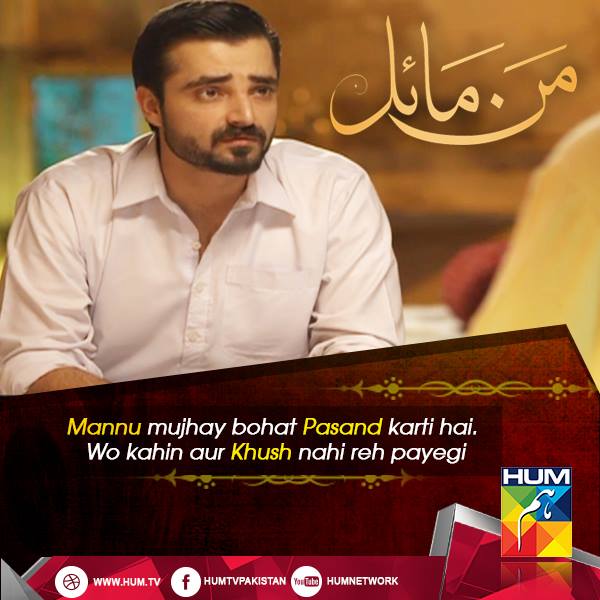 Photo: Mann Mayal - Official Facebook Page[/caption]
Photo: Mann Mayal - Official Facebook Page[/caption]
 Photo: Mann Mayal - Official Facebook Page[/caption]
We encourage the makers of television shows to make such vile
Photo: Mann Mayal - Official Facebook Page[/caption]
We encourage the makers of television shows to make such vile 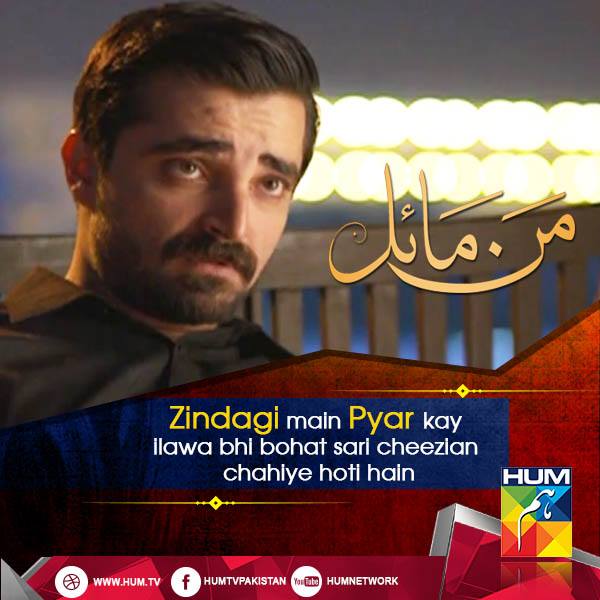 Photo: Mann Mayal - Official Facebook Page[/caption]
The rating of Mann Mayal has gone through the roof; young women are ardently watching the show and what’s sad is that they are even impressed and inspired by it! We are showing these girls that it’s okay to lust after our smoulderingly handsome teachers. It’s okay to hit upon any tough-looking guy who happens to cross our paths. Having said that, let me be very clear, love is an amazing thing to fall in, if done right. There is absolutely nothing wrong with falling in love, and that ending in marriage. But there is everything wrong with practically begging some guy to marry you, losing your self-esteem in the process, and not realising your self-worth and orchestrating a pitiable future for yourself.
[caption id="" align="alignnone" width="600"]
Photo: Mann Mayal - Official Facebook Page[/caption]
The rating of Mann Mayal has gone through the roof; young women are ardently watching the show and what’s sad is that they are even impressed and inspired by it! We are showing these girls that it’s okay to lust after our smoulderingly handsome teachers. It’s okay to hit upon any tough-looking guy who happens to cross our paths. Having said that, let me be very clear, love is an amazing thing to fall in, if done right. There is absolutely nothing wrong with falling in love, and that ending in marriage. But there is everything wrong with practically begging some guy to marry you, losing your self-esteem in the process, and not realising your self-worth and orchestrating a pitiable future for yourself.
[caption id="" align="alignnone" width="600"] Photo: Mann Mayal - Official Facebook Page[/caption]
We need more shows like
Photo: Mann Mayal - Official Facebook Page[/caption]
We need more shows like 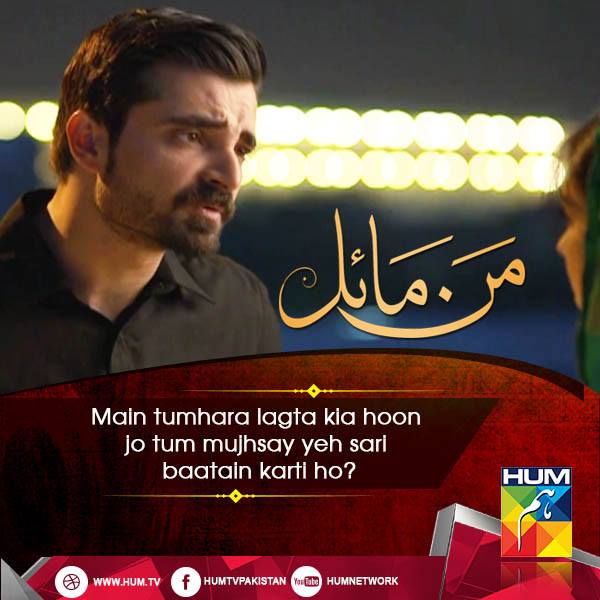 Photo: Mann Mayal - Official Facebook Page[/caption]
It breaks my heart to see the condition our entertainment media is in nowadays; it has become extremely commercialised and rating-oriented.
This is how it works: Get a good cast, record a really good title track, throw in a pinch of dramatics and voila! You have the perfect recipe for a hit show.
It’s high time our filmmakers re-evaluate themselves. They need to realise that they have a huge platform at their disposal. They play a pivotal role in
Photo: Mann Mayal - Official Facebook Page[/caption]
It breaks my heart to see the condition our entertainment media is in nowadays; it has become extremely commercialised and rating-oriented.
This is how it works: Get a good cast, record a really good title track, throw in a pinch of dramatics and voila! You have the perfect recipe for a hit show.
It’s high time our filmmakers re-evaluate themselves. They need to realise that they have a huge platform at their disposal. They play a pivotal role in 
 Photo: Facebook[/caption]
The movie starts with the main characters, Ayaan (
Photo: Facebook[/caption]
The movie starts with the main characters, Ayaan ( Photo: Screenshot[/caption]
Ayaan and Saadia are the directors of the project; Alia and Raheel play their roles in scene one. A dog-tired comedy but reasonable wit also weaves its way through the ‘very horror’ (pun intended) film as Alia is asked,
Photo: Screenshot[/caption]
Ayaan and Saadia are the directors of the project; Alia and Raheel play their roles in scene one. A dog-tired comedy but reasonable wit also weaves its way through the ‘very horror’ (pun intended) film as Alia is asked,
 Photo: Screenshot[/caption]
As the movie progresses, the plot solidifies as well. The suspense kicks in when Ayaan, the ‘director’, refuses to believe that there is a sinister
Photo: Screenshot[/caption]
As the movie progresses, the plot solidifies as well. The suspense kicks in when Ayaan, the ‘director’, refuses to believe that there is a sinister 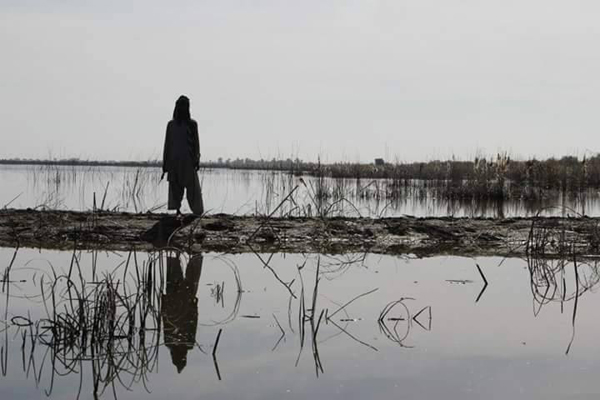 Photo: Facebook[/caption]
Ayaan is a violent bully and usually the first one to point fingers and label people as cowards. Despite being passionate about his so-called ‘dream’ project, he backs out. This is where the title of the movie Aksbandh or ‘inner reflection’ is realised.
But I’ll leave the details for the viewers to find out.
[caption id="" align="alignnone" width="600"]
Photo: Facebook[/caption]
Ayaan is a violent bully and usually the first one to point fingers and label people as cowards. Despite being passionate about his so-called ‘dream’ project, he backs out. This is where the title of the movie Aksbandh or ‘inner reflection’ is realised.
But I’ll leave the details for the viewers to find out.
[caption id="" align="alignnone" width="600"] Photo: Facebook[/caption]
The prowess of the director and producer of the film lies in their knack of enhancing the cinematic experience; producing a horror movie whilst retaining the element of believability is a truly commendable skill. The difference between filmic reality and role-play is depicted with a clarity that is remarkable.
The film concludes with the director's script becoming a reality – submerging fiction with reel-reality, leaving the audience overwhelmed. The film did not emit the kind of response that was expected from the audience.
Despite all efforts put into it, the movie was
Photo: Facebook[/caption]
The prowess of the director and producer of the film lies in their knack of enhancing the cinematic experience; producing a horror movie whilst retaining the element of believability is a truly commendable skill. The difference between filmic reality and role-play is depicted with a clarity that is remarkable.
The film concludes with the director's script becoming a reality – submerging fiction with reel-reality, leaving the audience overwhelmed. The film did not emit the kind of response that was expected from the audience.
Despite all efforts put into it, the movie was 

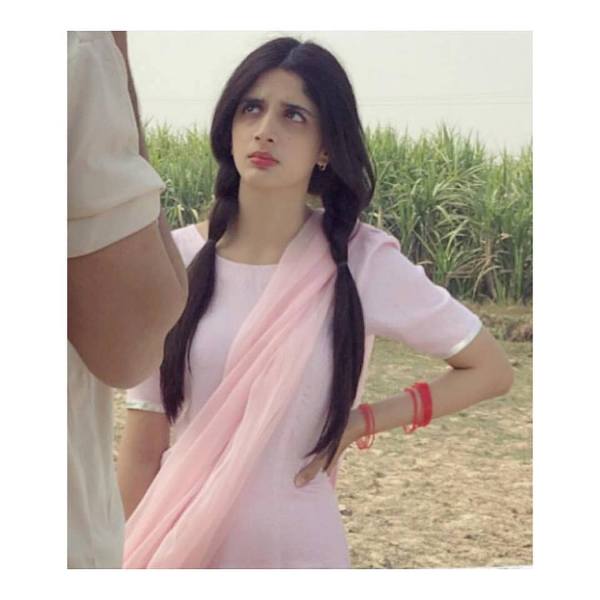 Photo: Facebook.[/caption]
Sammi also marks the comeback of Mawra Hocane who was last seen in the Indian production,
Photo: Facebook.[/caption]
Sammi also marks the comeback of Mawra Hocane who was last seen in the Indian production,  Photo: Facebook.[/caption]
In the pilot episode of Sammi that aired last
Photo: Facebook.[/caption]
In the pilot episode of Sammi that aired last 
 Mawra Hocane
Mawra Hocane Sania Saeed
Sania Saeed